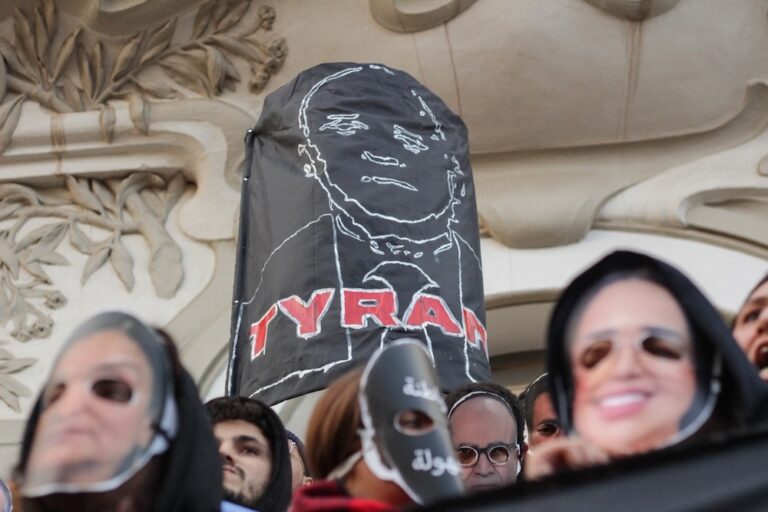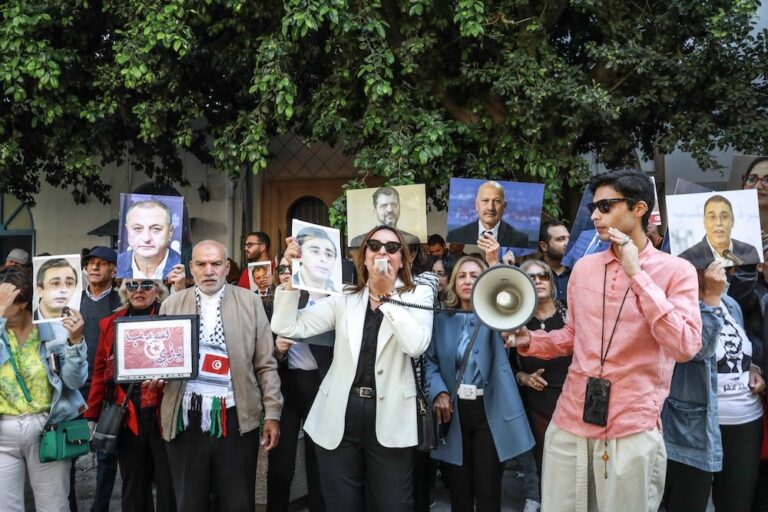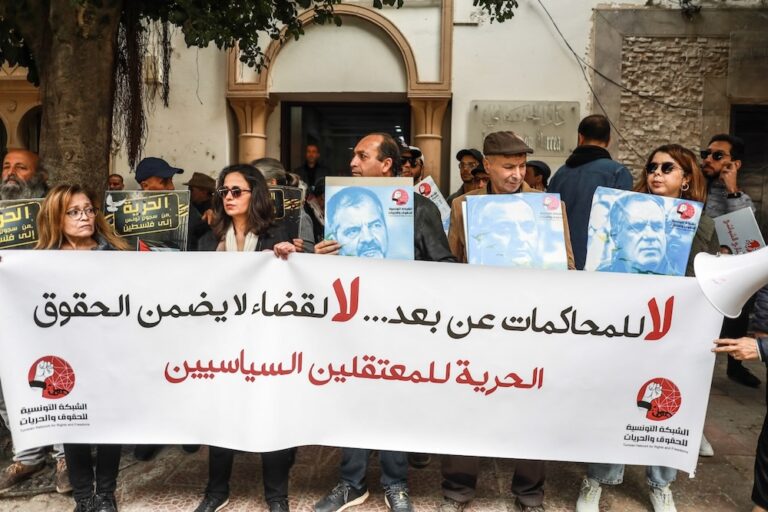(RSF/IFEX) – The following is a 29 March 2001 open letter by nine international human rights organizations: AMNESTY INTERNATIONAL AVOCATS SANS FRONTIÈRES EURO-MED HUMAN RIGHTS NETWORK INTERNATIONAL FEDERATION FOR THE LEAGUES OF HUMAN RIGHTS (FIDH) HUMAN RIGHTS WATCH INTERNATIONAL SERVICE FOR HUMAN RIGHTS OBSERVATORY FOR THE PROTECTION OF HUMAN RIGHTS DEFENDERS REPORTERS WITHOUT BORDERS WORLD […]
(RSF/IFEX) – The following is a 29 March 2001 open letter by nine international human rights organizations:
AMNESTY INTERNATIONAL
AVOCATS SANS FRONTIÈRES
EURO-MED HUMAN RIGHTS NETWORK
INTERNATIONAL FEDERATION FOR THE LEAGUES OF HUMAN RIGHTS (FIDH)
HUMAN RIGHTS WATCH
INTERNATIONAL SERVICE FOR HUMAN RIGHTS
OBSERVATORY FOR THE PROTECTION OF HUMAN RIGHTS DEFENDERS
REPORTERS WITHOUT BORDERS
WORLD ORGANIZATION AGAINST TORTURE (OMCT)
Brussels, 29 March 2001
EU Foreign Ministers
EU High Representative for CFSP
European Commissioner Chris Patten
Your Excellencies:
We are writing to you regarding the European Union’s upcoming Association Council meeting with Tunisia, which was scheduled to take place on 10 April. The Association Agreement, which was signed on 17 July 1995 by the European Community and its Member States on the one hand and by the Republic of Tunisia on the other hand, and which came into force on 1 March 1998, includes a legally binding human rights clause (art. 2). This clause stipulates that relations between the Parties, as well as all the provisions of the Agreement itself, shall be based on respect for human rights and democratic principles, which guide their domestic and international policies and constitute an essential element of the Agreement. Our organizations believe the EU Council of Ministers and the European Commission have an obligation to address in concrete terms the serious concerns about the human rights situation in Tunisia in the context of the Association Council and to put in place a mechanism to ensure the necessary monitoring of the situation, with a view to bringing about verifiable progress.
The deterioration of the human rights situation since the EU-Tunisian Agreement took effect poses an acute challenge to the EU policy toward Tunisia, and more generally toward the Mediterranean region. How the EU proceeds in this regard toward Tunisia, the first country where an Association Agreement came into effect, will have precedential impact on the EU’s credibility and effectiveness in addressing human rights issues with its other Mediterranean partners.
As noted by the European Commission itself in its recent communication on strengthening the Barcelona process of 6 September 2000, human rights, democracy, good governance and the rule of law should be discussed regularly with partners, notably within the Association Council. The Commission noted: “This could lead to the establishment of joint working groups on human rights” … that “would aim to agree on a number of concrete benchmarks and objective criteria to be reviewed within the various Association Councils…Cooperation on human rights, good governance and the rule of law should have as one of its main objectives the creation of a climate where NGOs can work productively.”
In its resolution of 14 December 2000 the European Parliament expressed concern “about the human rights situation and called on the Council and the Commission, “to use all the means provided for by the Association Agreement between the European Union and Tunisia to secure respect for democratic freedoms and human rights” and for the next meeting of the EU-Tunisia Association Council “to examine, in particular, the human rights situation in Tunisia and the restrictions placed on the activities of independent associations, in the context of the Meda-Democracy programme.”
In a previous resolution passed on 15 June 2000 the European Parliament stressed that “the promotion of human rights, democracy, civil liberties, the rule of law and sound management of public affairs constitutes an essential element of the EU-Tunisia Association Agreement with a view to creating a body of shared values.” In this resolution the European Parliament expressed concern “at the human rights situation in Tunisia, and called on the Association Council “to carry out as soon as possible a joint evaluation of respect for human rights in Tunisia in order to involve both parties in addressing the issue, and asked the Commission to present to Parliament a report on the evolution of the human rights situation in Tunisia.”
On 25 January 2001 France’s National Consultative Human Rights Commission also urged the French Government to encourage its EU partners to take steps to ensure a follow up of the human rights situation in Tunisia in the framework of the Association Agreement (art. 2), notably on the occasion of the next meeting of the Association Council.
In this context and in light of the increasingly grave attacks and restrictions on human rights defenders by the Tunisian authorities, the undersigned organizations (Amnesty International, Avocats sans frontières, the Euro-Med Human Rights Network, the International Federation for the Leagues of Human Rights, Human Rights Watch, the International Service for Human Rights, the Observatory for the Protection of Human Rights Defenders, Reporters Without Borders, and the World Organization Against Torture) call on the EU to urge Tunisia to fulfil its obligations under the Association Agreement and international human rights law by, among other things:
– freeing all persons detained or imprisoned solely for the-nonviolent exercise of the right to speech, association, or assembly;
– restoring the right to freedom of movement to all persons who are arbitrarily deprived of passports or forbidden to leave the country;
– ending all forms of harassment against human rights defenders and their relatives by, among other measures, restoring their passports, telephone, and fax service where these have been deprived; by ending police surveillance that is manifestly conducted as a form of intimidation; and by allowing all independent human rights organizations including the National Council on Liberties in Tunisia (CNLT) and the Tunisian Human Rights League (LTDH) to function legally and freely, in conformity with the UN Declaration on Human Rights Defenders;
– instituting effective safeguards to prevent the use of torture against persons in police custody;
– instituting a credible and transparent system for investigating allegations of abuse and ensuring that human rights abusers are identified and brought to justice; and
– inviting the UN Secretary-General’s Special Representative on human rights defenders to visit Tunisia.
Moreover, Tunisia should be urged not to obstruct European Commission efforts to provide grants to Tunisian non-governmental associations that seek such funding. The independence of the Commission in its decisions under Meda-Democracy should be fully recognised by the Mediterranean partners.
Article 2 of the Euro-Mediterranean Agreement provides the basis for programs to enhance human rights protection and promotion. We therefore strongly encourage the EU to ensure that its bilateral cooperation with Tunisia includes a strong component aimed at strengthening human rights and the rule of law.
In addition, Article 2 of the Euro-Mediterranean Agreement also involves concrete actions in the event of sustained and serious abuses. We therefore believe that full implementation of the Association Agreement with Tunisia requires the EU to raise concrete human rights concerns and press for verifiable progress on the basis of the recommendations specified above as well as the recommendations issued by the UN bodies.
We therefore call on the EU Council of Ministers and the European Commission to put in place concrete mechanisms to regularly assess compliance with Article 2 by all contracting parties to the Euro-Mediterranean Agreement. These should include:
– regular and impartial monitoring of developments in the field of human rights and civil liberties in the territory of any of the contracting parties;
– monitoring of the extent to which human rights defenders are free to act and speak out in defense of the rights of others;
– issuing specific recommendations, compliance with which can be regularly measured, that are aimed at improving the human rights situation and that take into account the recommendations made by the UN human rights bodies about the country concerned;
– making appropriate démarches towards partner countries in individual cases where violations of basic human rights standards have taken place;
– making the assessment of compliance with Article 2 a separate agenda item in all meetings held under the Agreement, and especially the Association Council meetings; and
– encouraging the Tunisian government to extend an invitation to the UN Secretary-General’s Special Representative on human rights defenders to visit Tunisia.
In light of the above we urge you to ensure that the Association Council, which was scheduled to take place on 10 April, is convened as soon as possible. The next meeting of the Association Council should not be another missed opportunity but should rather be the starting point of a process aiming at effectively addressing the human rights problems in Tunisia. To this end, it should set detailed benchmarks to be assessed at the next meetings to take place under the Agreement.
We thank you for your consideration of these matters.
Sincerely,
Amnesty International EU Office – Rue du Commerce 70-72 – B-1040 Brussels –
Tel: +3225021499 / Fax: +322 5025686, e-mail: amnesty-eu@aieu.be
Avocats Sans Frontières – 91, rue de l’Enseignement 1000 Bruxelles –
Tel: + 32 2 223 36 54 / Fax : + 32 2 223 36 14, e-mail: asf@asf.be
EuroMed Human Rights Network – Wilders Plads 8H – DK-1403 Copenhagen K
Tel: +45 32 69 8910 / Fax: +45 32 69 8901, e-mail: posten@euromedrights.net
Human Rights Watch – 15, Rue van Campenhout – 1000 Brussels –
Tel: +3227322009 / Fax: +3227320471, e-mail: hrwbe@hrw.org
International Federation of Human Rights (FIDH) – 17, Passage de la Main d’Or – F-75011 Paris, Tel: +33143552518 / Fax: +33143551880, e-mail:
International Service for Human Rights – 1, rue de Varembé – P.O. Box 16 – CH –
1211 Geneva 20 CIC, Tel: +41 22 733 51 23 / Fax: +41 22 733 08 26, e-mail: hrdo@worldcom.ch
Observatory for the Protection of HR Defenders (FIDH/OMCT)
e-mail: observatoire.paris@wanadoo.fr
Reporters Without Borders – 5, rue Geoffroy-Marie – F-75009 Paris
Tel: +33144838471 / Fax: +33145231151, e-mail: moyen-orient@rsf.fr
World Organization Against Torture (OMCT) – P.O Box 21, 8, rue du Vieux-Billard CH-1211 Genève 8, Tel: + 41 22 809 49 39 / Fax: + 41 22 809 49 29, e-mail: omct@omct.org
CC:
– Ms Catherine von Heidenstam, Foreign Affairs Ministry, Sweden
– M. Goblet d’Alviella, Foreign Affairs Ministry, Belgium
– M. Alberto Navarro, Office of the EU High Representative
– Ms Gonzalez Durantez, Office of European Commissioner Chris Patten
– Ms Vicky Bowman, Office of European Commissioner Chris Patten
– M. Alexandre Zafiriou, Secretariat General of the EU Council
– M. Lothar Jaschke, Secretariat General of the EU Council
– Mme van den Heuvel, Secretariat General of the EU Council
– M. Jan Thesleff, Swedish Permanent Representation to the EU
– M. Raimon Obiols, President of the European Parliament Delegation for Relations with the Maghreb countries
– M. Elmar Brok, President of the European Parliament Commission for Foreign Affairs, Human Rights, Common Security and Defence Policy.


